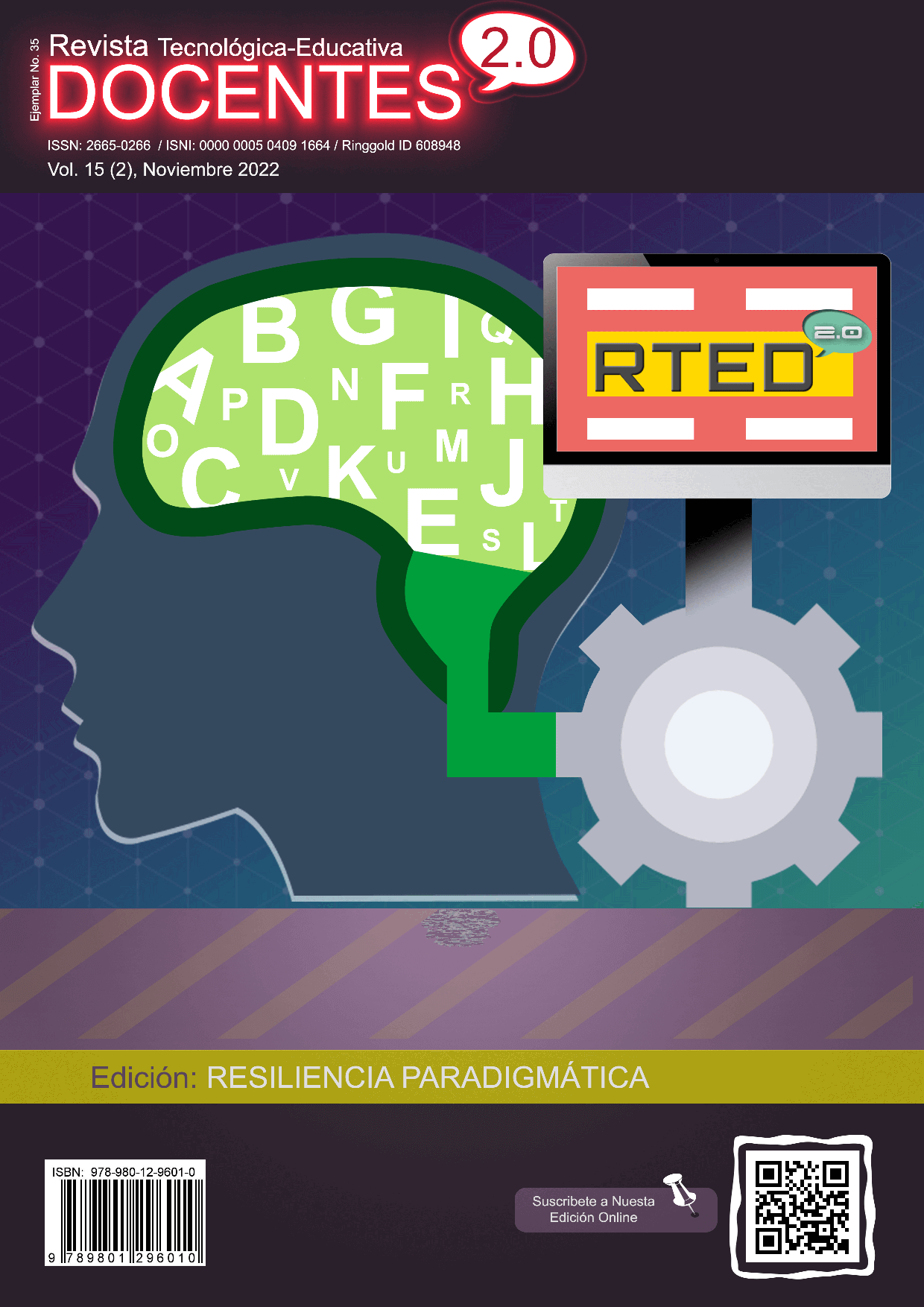Planificación Microcurricular como Herramienta Efectiva en los Logros de Aprendizajes de los Niños de la Educación Inicial
 DOI:
https://doi.org/10.37843/rted.v15i2.311
DOI:
https://doi.org/10.37843/rted.v15i2.311
Contenido principal del artículo
Resumen
La planificación microcurricular es una herramienta esencial que fortalece la metodología de trabajo que aplican los docentes en las instituciones educativas de la educación inicial, por eso, es necesario que esta planificación sea flexible y cumpla los cinco momentos: diagnóstico, propósito, selección de estrategias, herramientas y evaluación, según lo estipulado en el currículo nacional. El presente artículo tuvo como objetivo determinar si la planificación microcurricular desarrollada por los docentes contribuye a los logros de aprendizaje en el nivel de educación inicial. Referente a la metodología, se empleó el método deductivo, paradigma positivista, con enfoque cuantitativo, de tipo descriptivo-exploratorio y diseño no experimental. Se desarrolló con una muestra no probabilística por conveniencia conformada por 17 docentes de educación inicial en una institución educativa del cantón Santa Elena, provincia Santa Elena-Ecuador. Para la recolección de datos, se diseñó una encuesta con su respectiva escala de Likert, aplicada a los sujetos de estudio con el propósito de evaluar la efectividad de la planificación microcurricular. La confiabilidad del instrumento se la obtuvo con el programa estadístico SPSS, mediante, el coeficiente de Cronbach que reflejó un valor de 0,969. Como resultado se detectó que los docentes conocen las fases de la planificación microcurricular, sin embargo, evidencian dificultades al momento de efectuar dichas fases en la práctica. Se concluye que, cuando esta herramienta es aplicada de forma apropiada en todos sus momentos beneficia la adquisición de aprendizajes de los niños del nivel inicial.
Descargas
Métricas
Detalles del artículo

Esta obra está bajo una licencia internacional Creative Commons Atribución-NoComercial-SinDerivadas 4.0.
Aquellos autores que tengan publicaciones en nuestra revista aceptan los términos siguientes:
- En el momento en que una obra es aceptada para su publicación, el autor conserva los derechos de reproducción, distribución de su artículo para su explotación en todos los países del mundo en el formato proporcionado por nuestra revista, así como en cualquier otro soporte magnético, óptico y digital.
- Los autores conservarán sus derechos de autor y garantizarán a la revista el derecho de primera publicación de su obra, el cual estará simultáneamente sujeto a la Licencia de reconocimiento de Creative Commons (Attribution-NonCommercial-NoDerivatives 4.0 International (CC BY-NC-ND 4.0)) que permite a terceros copiar y redistribuir el material en cualquier medio o formato, Bajo las condiciones siguientes: Reconocimiento — Debe reconocer adecuadamente la autoría, proporcionar un enlace a la licencia e indicar si se han realizado cambios. Puede hacerlo de cualquier manera razonable, pero no de una manera que sugiera que tiene el apoyo del licenciador o lo recibe por el uso que hace. NoComercial — No puede utilizar el material para una finalidad comercial. SinObraDerivada — Si remezcla, transforma o crea a partir del material, no puede difundir el material modificado. No hay restricciones adicionales — No puede aplicar términos legales o medidas tecnológicas que legalmente restrinjan realizar aquello que la licencia permite.
- Los autores podrán adoptar otros acuerdos de licencia no exclusiva de distribución de la versión de la obra publicada (p. ej.: depositarla en un archivo telemático institucional o publicarla en un volumen monográfico) siempre que se indique la publicación inicial en esta revista.
- Se permite y recomienda a los autores difundir su obra a través de Internet (p. ej.: en archivos telemáticos institucionales, repositorios, bibliotecas, o en su página web), lo cual puede producir intercambios interesantes y aumentar las citas de la obra publicada.
- El retiro de un artículo se solicitará por escrito al Editor, haciéndose efectivo luego de respuesta escrita de este. Para tal efecto, el o los autores enviarán correspondencia vía E-mail: [email protected].
- El autor no recibirá compensación económica por la publicación de su trabajo.
- Todas las publicaciones de la Revista Docentes 2.0, están bajo la plataforma Open Journal System (OJS) en dirección: https://ojs.docentes20.com/
Citas
Aguilar-Gordón, F. D. (2020). Del aprendizaje en escenarios presenciales al aprendizaje virtual en tiempos de pandemia. Estudios pedagógicos (Valdivia), 213-220. http://dx.doi.org/10.4067/S0718-07052020000300213 DOI: https://doi.org/10.4067/S0718-07052020000300213
Ajila, Y. (2016). Planificación microcurricular, con metodología pertinente y rítmica corporal en el desarrollo de las nociones espaciales en los niños [Tesis de grado]. UTMACH. http://repositorio.utmachala.edu.ec/bitstream/48000/8873/1/ECUACS%20DE00004.pdf
Armando-Picon, G., González de Caballero, G. K., & Paredes-Sánchez, J. N. (2021). Desempeño y formación docente en competencias digitales en clases no presenciales durante la pandemia COVID-19. Arandu UTIC, 139-153. http://www.utic.edu.py/revista.ojs/index.php/revistas/article/view/129 DOI: https://doi.org/10.1590/SciELOPreprints.778
Bolaños, G., & Molina, Z. (1990). Introducción al currículo. EUNED. https://books.google.com.gt/books?id=Ew_JkA-5EaUC&printsec=frontcover#v=onepage&q&f=false
Dzul-Escamilla, M. (2010). Aplicación básica de los métodos científicos. https://www.uaeh.edu.mx/docencia/VI_Presentaciones/licenciatura_en_mercadotecnia/fundamentos_de_metodologia_investigacion/PRES38.pdf
Hernández-Ávila, C. E., & Carpio-Escobar, N. A. (2019). Introducción a los tipos de muestreo. Alerta, Revista científica Del Instituto Nacional De Salud, 2(1), 75–79. https://doi.org/10.5377/alerta.v2i1.7535 DOI: https://doi.org/10.5377/alerta.v2i1.7535
Hernández-Sampieri, R., Fernández-Collado, C., & Baptista-Lucio, P. (2014). Metodología de la investigación (6a. ed.). México D.F.: McGraw-Hill.
Hurtado, F. (2020). Planificación y evaluación curricular: Elementos fundamentales en el proceso educativo. Revista de Investigación en Ciencias Sociales, 5(2), 18. https://revistas.uclave.org/index.php/dissertare/article/view/2928/1826%0Ahttps://revistas
López-Salmorán, L. (2011). El concepto de logro educativo en sentido amplio. https://es.scribd.com/document/168361361/Elconceptodelogroeducativoensentidoamplio
Ministerio de Educación. (2014). Currículo Educación Inicial 2014. Ministerio de Educación. http://8.242.217.84:8080/jspui/handle/123456789/33456
Otzen, T., & Manterola, C. (2017). Técnicas de Muestreo sobre una Población a Estudio. Int. J. Morphol, 227-232. https://scielo.conicyt.cl/pdf/ijmorphol/v35n1/art37.pdf DOI: https://doi.org/10.4067/S0717-95022017000100037
Pozo, M., Suárez, M., & García, M. (2012). Logros educativos y diversidad en la escuela: hacia una definición desde el consenso. Revista de Educación. http://dx.doi.org/10-4438/1988-592X-RE-2012-358-183
Quero-Virla, M. (2010). Confiabilidad y coeficiente Alpha de Cronbach. Telos, 248-252. https://www.redalyc.org/pdf/993/99315569010.pdf
Rodríguez, A. (2021). Planificación curricular y desempeño docente de una Unidad Educativa de Santa Elena, Ecuador 2021 [Tesis de posgrado]. Universidad César Vallejo. https://repositorio.ucv.edu.pe/bitstream/handle/20.500.12692/64956/Rodriguez_MAA-SD.pdf?sequence=1&isAllowed=y
Rojas-Cairampoma, M. (2015). Tipos de Investigación científica: Una simplificación de la complicada incoherente nomenclatura y clasificación. Revista Electrónica de Veterinaria, 16(1),1-14. https://www.redalyc.org/articulo.oa?id=63638739004
Unicef. (2020). La emergencia sanitaria supone un desafío para el aprendizaje de los niños. https://www.unicef.org/ecuador/comunicados-prensa/la-emergencia-sanitaria-supone-un-desaf%C3%ADo-para-el-aprendizaje-de-los-ni%C3%B1os
Unicef. (2021). Los niños no pueden seguir sin ir a la escuela, afirma UNICEF. https://www.unicef.org/ecuador/comunicados-prensa/los-ni%C3%B1os-no-pueden-seguir-sin-ir-la-escuela-afirma-unicef






